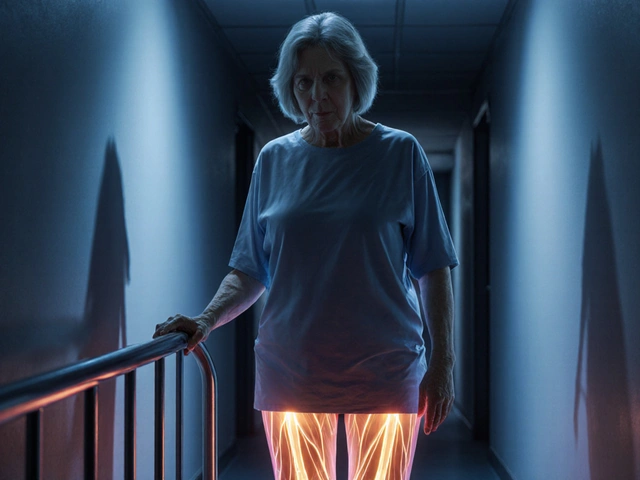Sleep Aid Selector
Find Your Perfect Sleep Aid
Answer a few quick questions to get personalized recommendations for the best sleep aid for your situation.
Quick Takeaways
- Unisom (diphenhydramine) works by blocking histamine, causing drowsiness but often leaves next‑day grogginess.
- Melatonin mimics the body’s natural sleep hormone, ideal for jet‑lag or shift‑work without heavy sedation.
- Doxylamine succinate is another antihistamine that tends to last longer than diphenhydramine.
- Herbal options like valerian root and magnesium glycinate are gentle and non‑habit‑forming, but effects vary.
- Prescription agents such as suvorexant target sleep pathways directly and are best reserved for chronic insomnia.
What is Unisom (Diphenhydramine)?
When you pick up a box of Unisom (the brand name for diphenhydramine), you’re buying an over‑the‑counter antihistamine that doubles as a sleep aid. It was first approved in the 1940s as an allergy medication and later marketed for nighttime use because it crosses the blood‑brain barrier and blocks histamine receptors, inducing drowsiness.
How Diphenhydramine Makes You Sleep
Diphenhydramine is a first‑generation antihistamine. By binding to H1 receptors in the central nervous system, it reduces the wake‑promoting effects of histamine. The result is a rapid onset of sleep-usually within 30minutes-but the drug’s half‑life (about 9hours) often leads to morning fog.
Key Decision Criteria for Choosing a Sleep Aid
- Onset speed: How fast you fall asleep after the dose.
- Duration: Does the effect wear off by morning?
- Next‑day performance: Presence of grogginess or impaired cognition.
- Safety profile: Interaction risk, contraindications, and habit‑forming potential.
- Regulatory status: OTC vs prescription.

Side‑by‑Side Comparison of Popular Alternatives
| Product | Typical Dose | Onset | Duration | Pros | Cons |
|---|---|---|---|---|---|
| Unisom (Diphenhydramine) | 25-50mg | 30min | 6-8h | Fast, inexpensive, widely available | Morning grogginess, anticholinergic side‑effects |
| Doxylamine Succinate | 25mg | 30-45min | 8-10h | Longer sleep window, less next‑day sedation for some | Similar anticholinergic profile, not ideal for shift workers |
| Melatonin | 0.5-5mg | 15-30min | 4-6h | Regulates circadian rhythm, minimal hangover | Less effective for severe insomnia, dosage timing critical |
| Valerian Root | 400-900mg extract | 30-60min | 4-7h | Herbal, non‑habit‑forming | Variable potency, possible mild headache |
| Magnesium Glycinate | 200-400mg | 45-60min | 5-7h | Improves muscle relaxation, supports heart health | May cause loose stools at high doses |
| CBD Oil | 15-30mg | 30-45min | 4-6h | Anxiety‑reducing, anti‑inflammatory | Regulatory gray area, quality varies |
Deep Dive into Each Alternative
Doxylamine Succinate
Doxylamine is the active ingredient in products like “SleepTabs”. It shares the antihistamine class with diphenhydramine but binds more strongly to H1 receptors, which can translate to a longer sleep window. For people who need a full night of rest, it’s a solid second‑choice, though the anticholinergic side effects (dry mouth, constipation) remain.
Melatonin
Melatonin is a hormone your pineal gland releases when darkness falls. Supplemental melatonin works best when your sleep difficulty stems from a misaligned circadian rhythm-think jet lag, shift work, or delayed‑sleep‑phase syndrome. Because it doesn’t sedate you, you won’t feel “knocked out”, and next‑day performance stays sharp.
Valerian Root
Valerian has been used in herbal medicine for centuries. Its active compounds (valerenic acids) interact with GABA receptors, promoting relaxation. Clinical trials show modest improvements in sleep latency, and it’s especially popular among people who avoid synthetics.
Magnesium Glycinate
Magnesium supports over 300 enzymatic reactions, including those that regulate the nervous system. Glycinate is a chelated form that is gentle on the stomach and highly bioavailable. People with restless‑leg syndrome often notice smoother sleep when they top up magnesium.
CBD Oil
Cannabidiol (CBD) interacts with the endocannabinoid system, which influences stress and sleep architecture. While research is still emerging, many users report reduced nighttime anxiety and quicker sleep onset. Quality matters; look for third‑party tested, full‑spectrum products.
When to Reach for a Prescription Sleep Aid
If over‑the‑counter options fail after a few weeks, a doctor might prescribe agents like Suvorexant (a dual orexin receptor antagonist). Suvorexant directly blocks the wake‑promoting orexin neuropeptides, providing a sleep‑preserving effect without the heavy anticholinergic load of antihistamines. It’s most appropriate for chronic insomnia diagnosed by a healthcare professional.

Safety, Interactions, and Who Should Avoid Certain Options
- Pregnant or breastfeeding individuals: Diphenhydramine and doxylamine are generally considered safe in short‑term use, but melatonin’s safety data are limited; consult a clinician.
- Elderly users: Antihistamines can increase fall risk due to dizziness and urinary retention. Herbal alternatives or low‑dose melatonin may be gentler.
- People on antidepressants or blood thinners: CBD can affect CYP450 metabolism; magnesium may enhance the effect of certain blood pressure meds.
- Drivers or heavy‑machinery operators: Avoid diphenhydramine, doxylamine, or high‑dose CBD the morning after a dose.
How to Choose the Right Sleep Aid for You
Use this simple flow:
- Is your problem occasional (once‑a‑week) or chronic (most nights)?
- Occasional → try compare Unisom with a single dose of diphenhydramine or melatonin.
- Chronic → discuss prescription options with a doctor.
- Do you need to wake up early and stay alert?
- Yes → favor melatonin, valerian, or magnesium (shorter half‑life).
- No → antihistamines work fine.
- Do you have a history of dry mouth, constipation, or glaucoma?
- Yes → avoid diphenhydramine and doxylamine; choose herbal or mineral alternatives.
- Are you pregnant, nursing, or an older adult?
- Yes → consult a clinician; melatonin (low dose) or magnesium are usually safest.
Practical Tips for Getting the Most Out of Any Sleep Aid
- Take the dose 30minutes before your intended bedtime-no screens after taking.
- Keep a sleep diary for two weeks to track onset, total sleep time, and morning alertness.
- Combine low‑dose melatonin with a calming bedtime routine (warm shower, dim lights) for best results.
- Avoid alcohol; it interacts with antihistamines and can worsen next‑day grogginess.
- If you miss a dose, don’t double up. Wait until the next night.
Frequently Asked Questions
Can I use Unisom every night?
Occasional use (once or twice a week) is generally safe for most adults. Daily use can lead to tolerance, rebound insomnia, and anticholinergic side effects, so it’s not recommended without medical guidance.
Is melatonin better than diphenhydramine for jet lag?
Yes. Melatonin aligns your internal clock, which is the core issue with jet lag. Taking 0.5-3mg at your target bedtime for a few days usually restores normal sleep patterns faster than a sedating antihistamine.
Do valerian root or magnesium cause dependence?
Both are considered non‑habit‑forming. Valerian works through GABA modulation but doesn’t produce a withdrawal syndrome. Magnesium is a mineral; once you stop, sleep returns to baseline without rebound effects.
Can I mix CBD oil with an antihistamine?
Mixing is generally safe, but both can cause drowsiness. Starting with a low CBD dose (5mg) and monitoring how you feel reduces the risk of excessive sedation.
When should I see a doctor for insomnia?
If you’ve tried at least two OTC options for three weeks and still struggle to fall asleep or stay asleep, or if insomnia is affecting work, mood, or safety, schedule a medical evaluation.






Dan Dawson
Thanks for the rundown
Robert Frith
Wow this post is legit useful but I gotta say the US market is full o' cheap meds that dont really wokr for real insomniacs. Like, you just pop a pill and expect miracles? Nah bro, you need proper rest routine. And dont forget those antihistamines can make you feel like a zombie the next day. It's just a quick fix, not a solution. If you want real sleep, ditch the junk and look for natural stuff.
Lawrence Jones II
🔬 The pharmacodynamics of diphenhydramine indeed involve H1 antagonism, leading to central histaminergic blockade. 🧪 However, the anticholinergic load may precipitate cognitive fog, especially in users with compromised cholinergic transmission. 🤔 If the half‑life is ~9 h, residual plasma concentrations can affect REM architecture. 🕒 Consider titrating melatonin dosing to align with circadian phase response curves for optimal phase‑shifting. 📈
Brad Tollefson
The table you provided is quite comprehensive. It clearly outlines onset and duration for each option, which helps when matching a sleep aid to one’s schedule. I appreciate the note about anticholinergic side effects, especially for elderly users. It’s also valuable that you mentioned the importance of timing melatonin relative to the bedtime window. Overall, the guide is well‑structured and user‑friendly.
Paul van de Runstraat
Oh great, another perfectly organized chart-because we all need a spreadsheet to decide whether to feel groggy tomorrow.
ANTHONY COOK
Look, if you’re in the US and buying cheap Unisom off the shelf, you’re basically signing up for a nightly brain fog marathon. Antihistamines are fine for occasional use, but the nation’s over‑reliance on them is a symptom of our lifestyle. Forget the hype around melatonin when you could just pop a cheap pill and be out like a light. The real issue is our obsession with quick fixes.
Sarah Aderholdt
While the convenience of OTC antihistamines is undeniable, the long‑term cognitive costs merit serious reflection. A balanced approach-incorporating sleep hygiene alongside occasional supplementation-tends to yield sustainable rest without compromising daytime clarity.
Phoebe Chico
Picture this: a moonlit night, a cup of warm tea, and the gentle embrace of valerian dancing through your senses. 🌙✨ It's not just a herb; it's a lullaby for the mind, swirling with ancient whispers and modern relaxation. If you crave a night free of synthetic haze, let nature write your bedtime story.
Larry Douglas
The pharmacological profile of valerian root involves GABA modulation, which can augment inhibitory neurotransmission. Nevertheless, variability in active constituent concentrations warrants standardization for clinical reliability. Consequently, while it offers a favorable side‑effect profile, dosage consistency remains a challenge for evidence‑based application.
Michael Stevens
Great summary! I think it’s helpful to remind people that pairing any sleep aid with a calm pre‑bed routine can boost effectiveness. Sometimes a simple stretch or a short meditation can make a big difference.
Ann Campanella
Sounds like another excuse to avoid real work on sleep habits.
Linda Stephenson
When choosing a sleep aid, it's essential to evaluate both pharmacokinetic and pharmacodynamic properties to match personal circadian demands. First, consider the onset of action; a rapid onset, such as that of diphenhydramine, can be advantageous for individuals with difficulty falling asleep within 30 minutes. Second, the half‑life dictates residual daytime effects; a longer half‑life may result in next‑day grogginess, which can impair cognitive performance, especially in tasks requiring sustained attention. Third, the mechanism of action matters: antihistamines block H1 receptors and produce sedation, but also anticholinergic side effects, whereas melatonin directly influences the suprachiasmatic nucleus to regulate circadian phase. Fourth, patient-specific factors such as age, comorbidities, and concurrent medications must guide selection; elderly patients are more susceptible to anticholinergic burden and fall risk. Fifth, safety profiles differ: herbal supplements like valerian lack robust regulatory oversight, leading to variability in active compound concentrations. Sixth, non‑pharmacologic strategies, such as sleep hygiene, should complement any pharmacologic intervention to address underlying behavioral contributors to insomnia. Seventh, for shift workers who require flexible sleep timing, melatonin dosing timed appropriately can realign the internal clock with work schedules. Eighth, chronic insomnia warrants a thorough evaluation for underlying sleep disorders, and may necessitate prescription agents like orexin antagonists. Ninth, dosage titration should start low and increase only if needed, monitoring for adverse effects. Tenth, patients should be educated about potential interactions; for example, magnesium may potentiate the hypotensive effects of certain antihypertensives. Eleventh, the regulatory status influences accessibility; OTC options provide convenience but may lack individualized guidance. Twelfth, cost considerations can affect adherence; inexpensive antihistamines are widely available, whereas proprietary formulations may be cost‑prohibitive. Thirteenth, patient preference plays a role; some may favor natural products despite limited evidence. Fourteenth, clinicians should document response and side effects systematically using a sleep diary or validated questionnaires. Finally, an individualized, evidence‑based approach, integrating both pharmacologic and behavioral elements, offers the best chance for sustainable, restorative sleep.
Sunthar Sinnathamby
Linda’s deep dive really hits the mark-let’s take that thorough checklist and actually put it into practice. Start a sleep journal, pick a low‑dose melatonin on work nights, and keep the bedroom dark. Small changes add up!
Catherine Mihaljevic
Honestly most of these OTC options are just pharma’s way to keep us dependent, they’re pushing chemicals while the real fix is hidden.
Callum Smyth
Great discussion! Remember, the best sleep aid is the one that fits your lifestyle without compromising safety. Keep experimenting responsibly 😊